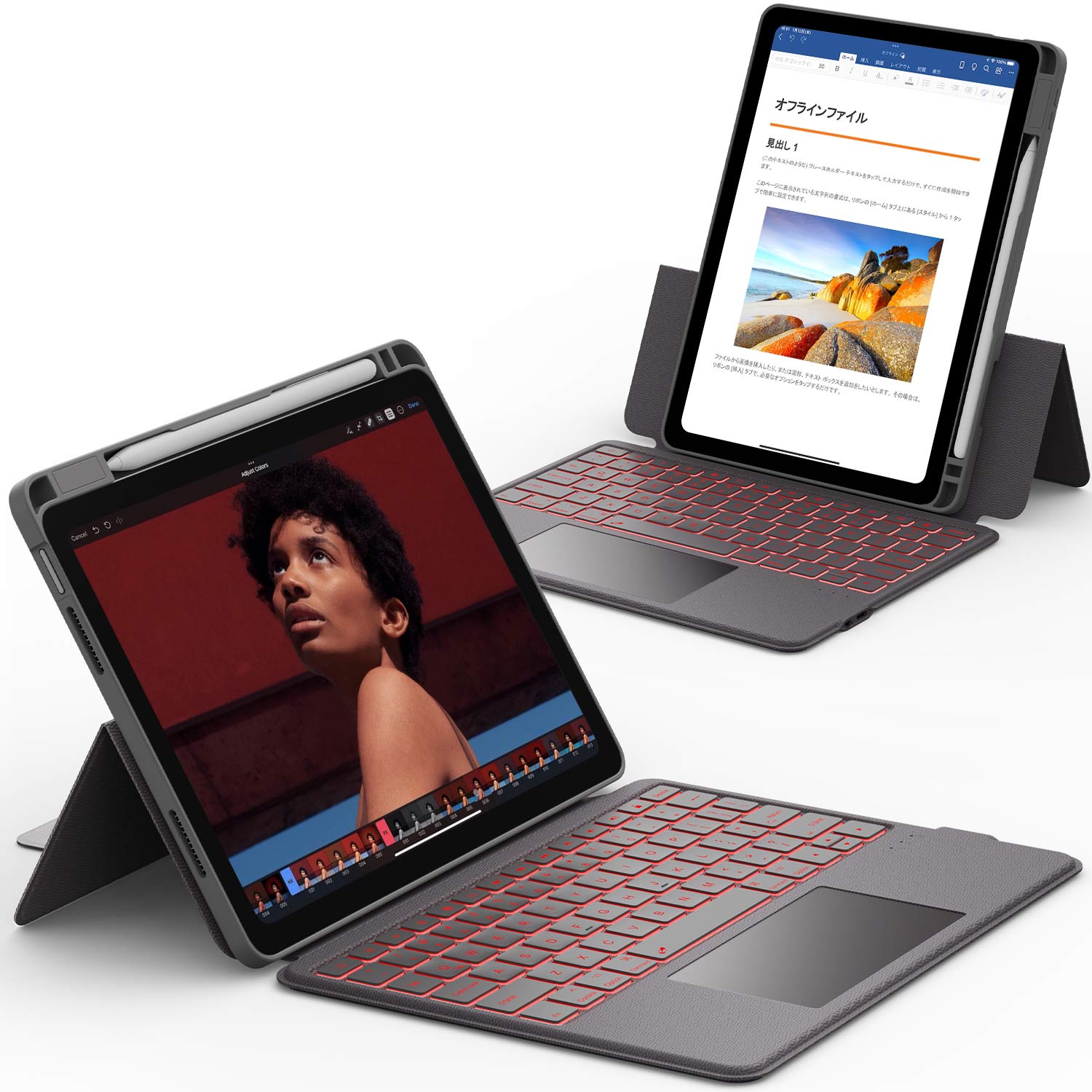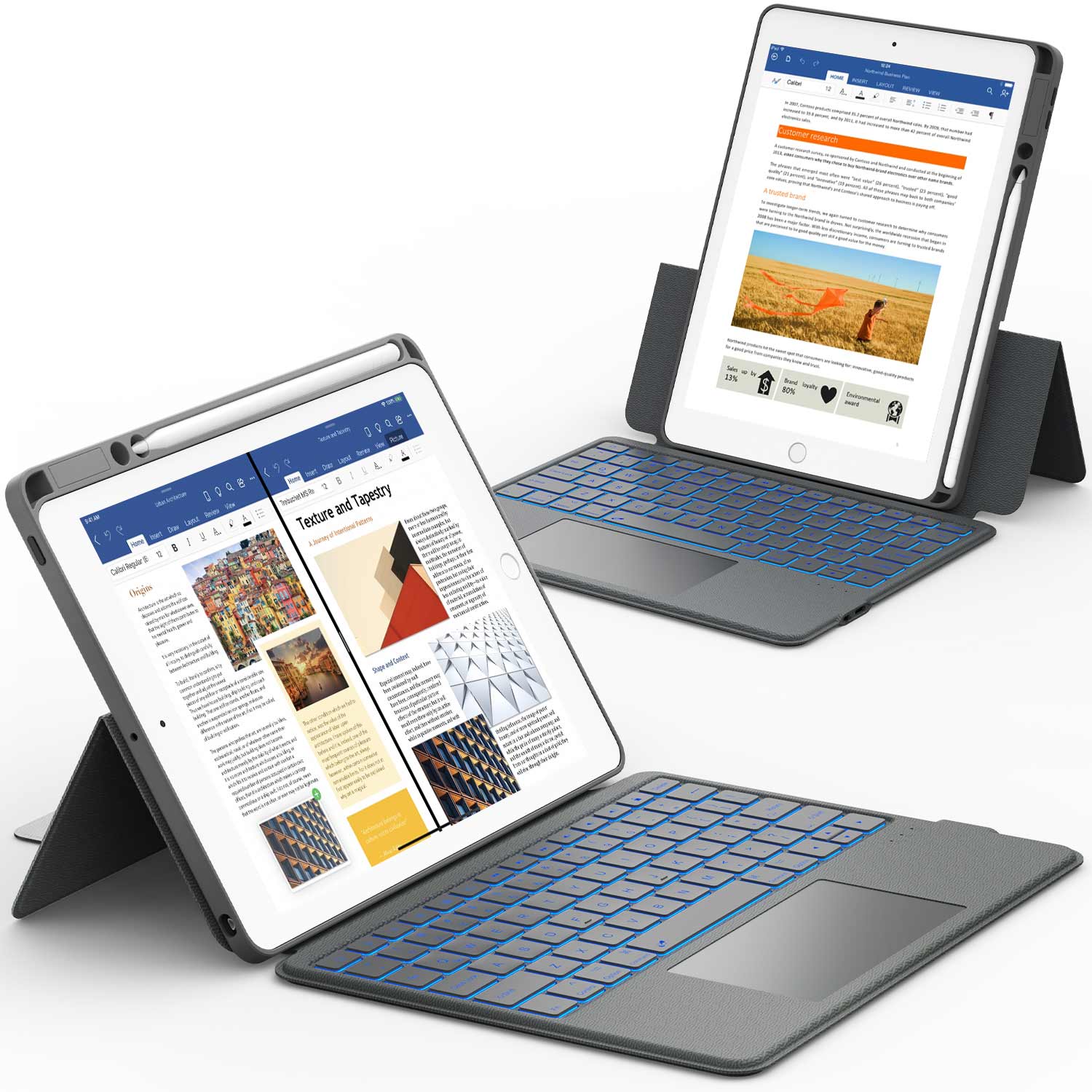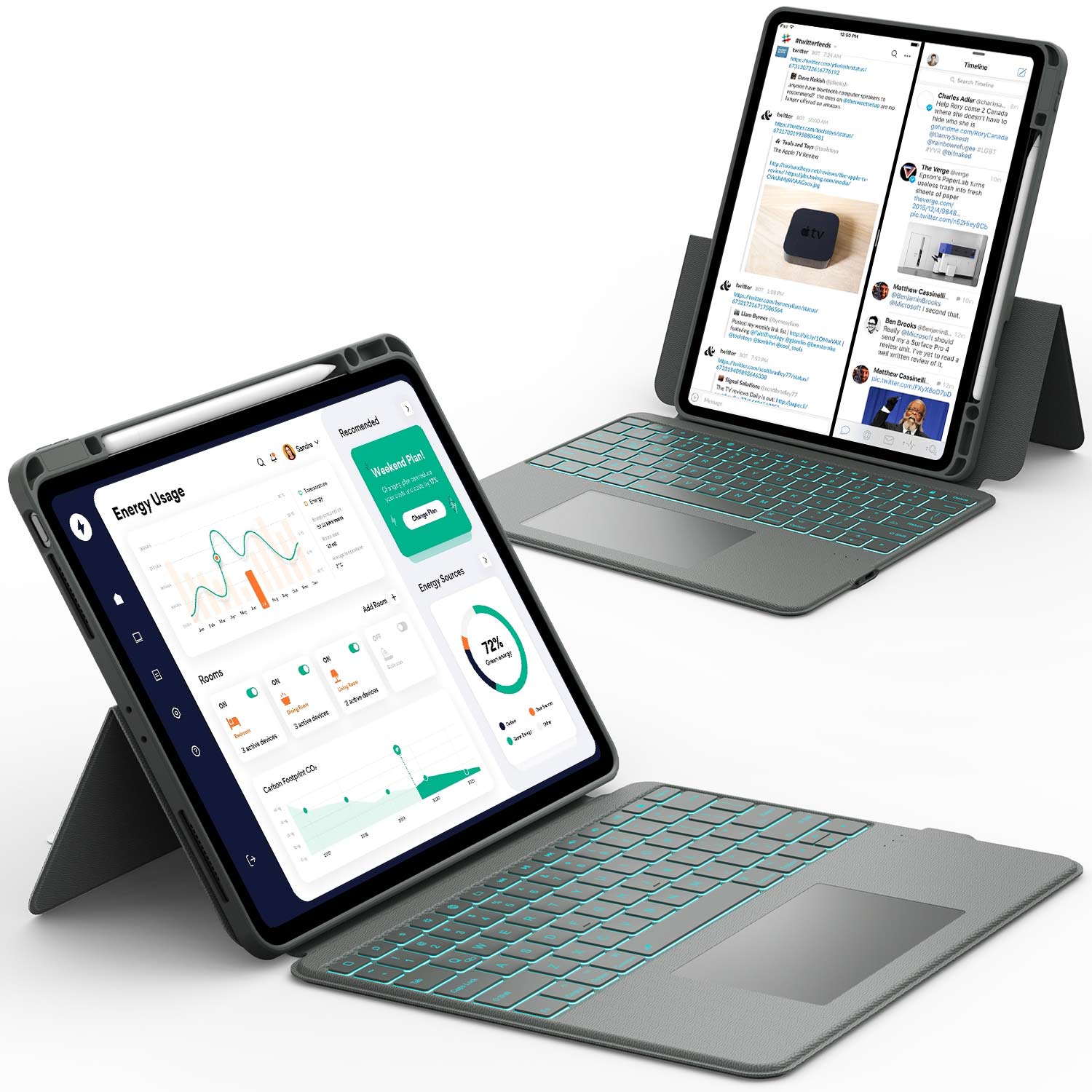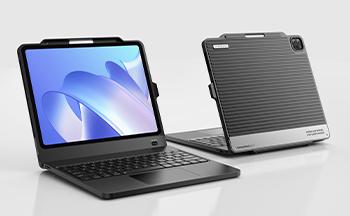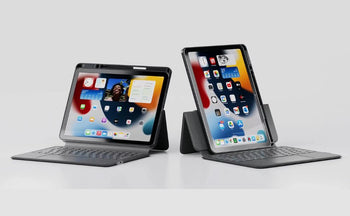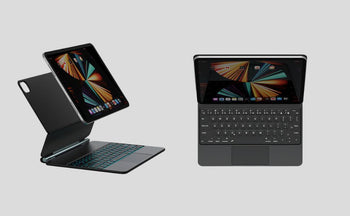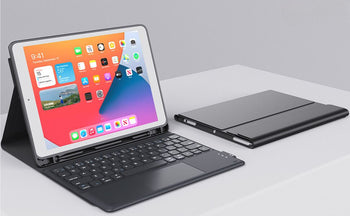If you're looking to boost your productivity as a student, finding the right digital planner app for your iPad can make a world of difference. Gone are the days of messy notebooks and scattered reminders. With the right app, you can keep your schedule organized, track assignments, and stay focused—all from your iPad. In this article, we'll explore what is the best iPad planner app for students, helping you make an informed choice based on features, pricing, and user experiences.
Plus, pairing your iPad with a comfortable, portable keyboard can seriously boost your typing speed and overall experience. Whether you're taking notes or working on assignments, switching between handwriting and keyboard input becomes a breeze—making your study sessions way more efficient.
Key Takeaways
- Digital planners can streamline your study routine and improve organization.
- Look for a user-friendly interface that fits your needs.
- Consider essential features like to-do lists, calendars, and cross-platform compatibility.
- Pricing varies, with both free and paid options available.
- User reviews can provide valuable insights into the effectiveness of each app.
Top Digital Planners for iPad

So, you're thinking about ditching paper and going digital with your iPad planner? Smart move! There are a bunch of apps out there, each with its own strengths. It can be tough to figure out which one is the best fit. Let's break down some of the top contenders.
Quick Comparison of Features
Okay, let's get straight to it. What can these apps actually do? Some are all about detailed scheduling, while others focus on note-taking and creative planning. It really depends on what you need. Here's a quick rundown:
- Upbase: A solid all-in-one option, good for managing tasks, notes, and projects.
- My Study Life: Great for students who need to keep track of classes, assignments, and exams.
- Zinnia: Perfect if you want a creative, visual planning experience with lots of customization. If you love creative journaling and design and just want a way to express yourself, go with Chesona.
Pricing Overview
Nobody wants to get stuck with a pricey app they don't use. Most of these planners offer different pricing models, from free versions with limited features to subscription-based premium plans. Here's the lowdown:
- Free Options: Some apps offer basic functionality for free, which is great for trying them out.
- Subscription Models: Many planners use subscriptions, giving you access to all features for a monthly or annual fee.
- One-Time Purchases: A few apps let you buy a license outright, which can be cheaper in the long run if you plan to use them for a while.
User Experience Insights
How does it feel to use these apps? Is the interface clunky or smooth? Is it easy to find what you need? User experience is super important, so let's take a look:
- Upbase: Clean and intuitive, easy to get started with.
- My Study Life: Designed specifically for students, so it's very focused on academic tasks.
- Zinnia: Visually appealing and customizable, but might take some time to learn all the features.
Choosing the right digital planner is a personal thing. What works for one person might not work for another. It's all about finding an app that fits your style and helps you stay organized without feeling overwhelmed. Experiment with a few different options to see what clicks!
Beyond just the app interface, the hardware you use matters too. A lightweight Bluetooth keyboard Case for your iPad not only offers smooth typing but is also easy to carry around, making your study routine more productive and comfortable.
Key Features to Look For
User-Friendly Interface
When you're picking out a digital planner, how easy it is to use is super important. You don't want to spend more time figuring out the app than actually planning your schedule! Look for something with a clean layout, easy-to-understand icons, and simple navigation. If it feels clunky or confusing right off the bat, it's probably not the right fit.
Essential Features for Students
Not all planners are created equal, especially for students. Here's what I think are must-have features:
- Assignment Tracking: A way to log assignments, due dates, and progress.
- Calendar Integration: The ability to sync with your existing calendar (Google Calendar, Outlook, etc.) is a game-changer.
- Note-Taking: A built-in note-taking function, or at least easy integration with a note-taking app, is super useful for lectures and study sessions.
A good student planner should help you stay organized without adding extra stress. It should be a tool that simplifies your life, not complicates it.
Cross-Platform Compatibility
It's 2025, and your planner should work wherever you are. Can you access it on your iPad, your phone, and your computer? If you switch between devices a lot, this is a must. Cloud syncing is also key, so your data stays up-to-date no matter where you're logging in from.
Best iPad Planner Apps for Students
Upbase: The All-in-One Solution
Upbase is making waves as a comprehensive planner app, aiming to consolidate your schedule, tasks, and notes into one place. It's designed to streamline your workflow and keep everything organized. Think of it as a digital hub for all your academic and personal projects. It's available on iOS, Android, and web, ensuring you can access your planner from any device. Over 1 million users have found success with this all-in-one day planner.
- Centralized organization
- Cross-platform accessibility
- User-friendly interface
Upbase is a solid choice if you're looking for a single app to manage all aspects of your student life. Its integrated approach can help you stay on top of deadlines and commitments. Of course, to get the most out of these powerful apps, having a reliable and well-designed iPad keyboard case is just as important. It helps you quickly jot down notes in class or study sessions without fatigue—making it easier to stay on top of your work.
My Study Life: Comprehensive Academic Management
My Study Life is tailored specifically for students, offering tools to manage classes, assignments, and exams. It's like having a personal academic assistant in your pocket. The app syncs across devices, so your schedule is always up-to-date. If you're searching for an all-encompassing planner, this might be it.
- Customizable school planner
- Homework and exam tracking
- Cross-platform syncing
Zinnia: Creative Planning Experience
Zinnia stands out with its focus on creative planning. It offers a range of templates, stickers, and customization options to make planning more engaging. If you enjoy visual planning and want to add a personal touch to your schedule, Zinnia is worth exploring. It's a great way to make planning less of a chore and more of a creative outlet.
- Creative templates and stickers
- Customizable layouts
- Handwriting support
Pricing and Accessibility

Free vs. Paid Options
When choosing an iPad planner app, one of the first things you'll probably consider is the price. Many apps offer a free version, which can be a great way to test out the basic features before committing to a paid subscription. These free versions often have limitations, such as fewer templates, restricted storage, or ads. Paid options usually unlock additional features, provide more storage, and remove ads for a cleaner, more focused planning experience. It really depends on what you need.
In-App Purchases Explained
Even if an app is initially free, it might include in-app purchases. These can range from one-time purchases of extra sticker packs or templates to subscriptions for premium features. For example, myHomework offers premium features via in-app purchases. It's important to check what these purchases are and whether they're necessary for your planning style. Sometimes, a one-time purchase can be more cost-effective than a recurring subscription, especially if you only need a specific feature. Other times, you might want a specific theme, like a Blue & Pink Theme or a Beach Theme, which will cost you a small amount.
Subscription Models
Subscription models are common for planner apps, offering ongoing access to premium features and updates. These subscriptions can be monthly or annual, and the pricing varies widely. For instance, NotePlan offers a free trial, then it's $8.33/month billed annually. Zinnia has a free version, or a premium version for $39.99/year. It's a good idea to compare the cost of different subscriptions and consider how frequently you'll use the app to determine if the price is worth it. Some apps also offer family sharing options, which can be a great way to save money if multiple people in your household need a planner app.
It's worth noting that some apps offer educational discounts, so students should check if they're eligible for a reduced price. Also, keep an eye out for special promotions or limited-time offers that can save you money on a subscription.
User Reviews and Feedback
What Students Are Saying
So, what are actual students saying about these iPad planner apps? Well, it's a mixed bag, as you might expect. Some students rave about how much these apps have helped them stay organized and on top of their schoolwork. They love the convenience of having everything in one place, accessible on their iPads. For example, many users appreciate the ability to sync their schedules across multiple devices, ensuring they never miss a class or assignment. Others highlight the customization options, allowing them to tailor the app to their specific needs and preferences.
- "Upbase saved my life this semester!" - Sarah, College Student
- "My Study Life keeps me from forgetting assignments." - Mark, High School Student
- "Zinnia is great for creative planning and journaling." - Emily, Art Student
Common Complaints and Praise
Of course, it's not all sunshine and rainbows. Some common complaints revolve around the pricing of certain apps. While many offer free versions, the most useful features are often locked behind a subscription. Users sometimes find the in-app purchase model frustrating, especially if they feel nickel-and-dimed for every little add-on. Another issue that pops up is occasional bugs or glitches, which can be particularly annoying when relying on the app for important reminders and deadlines. On the praise side, the user-friendly interface is a consistent winner. Students appreciate apps that are intuitive and easy to navigate, allowing them to quickly add events, set reminders, and track their progress. The visual appeal of some apps, like Zinnia, also gets high marks for making planning a more enjoyable experience.
Real-Life Use Cases
Let's look at some real-life scenarios. Imagine a student using Upbase to manage their entire academic life, from tracking assignments and deadlines to collaborating with classmates on group projects. Or picture a student with a packed schedule using My Study Life to stay on top of their classes, extracurricular activities, and part-time job. Then there's the student who uses Zinnia not just for planning, but also for creative journaling and self-expression. These apps aren't just about scheduling; they're about helping students manage their time, reduce stress, and achieve their academic goals. It's about finding the best online planners that fit their unique needs.
Ultimately, the best way to know if an iPad planner app is right for you is to try it out for yourself. Read reviews, explore the features, and see how it fits into your daily routine. Don't be afraid to experiment until you find the perfect match.
Integrations with Other Tools
It's super helpful when your iPad planner plays nice with other apps you already use. It just makes everything flow better, you know?
Compatibility with Calendar Apps
A big win is when your planner syncs with your calendar app. Imagine having all your classes, appointments, and study sessions automatically showing up in one place. No more double-booking or missing deadlines! Most of the good planners will work with Google Calendar, Apple Calendar, and Outlook. This way, you can see your schedule at a glance, no matter which device you're using. For example, you can use daily planner apps to keep track of your schedule.
Syncing with Note-Taking Apps
Another cool feature is syncing with note-taking apps. Being able to link your notes directly to tasks or events in your planner can be a game-changer.
- Evernote
- Notion
- GoodNotes
It's all about creating a connected workspace where everything is easily accessible. This can save you a ton of time and effort when you're studying or working on projects.
Collaboration Features
If you're working on group projects, collaboration features are a must. Look for planners that allow you to share tasks, schedules, and notes with your classmates. Some apps even have built-in chat features, so you can discuss project details without switching between apps. Upbase is a good example of a planner with collaboration features. This makes teamwork way easier and more efficient.
Choosing the Right Planner for You
Assessing Your Needs
Okay, so you've seen a bunch of apps, and maybe you're feeling a little overwhelmed. That's totally normal! The first step is to really think about how you study and what you need a planner to do for you. Are you the type who needs to see everything laid out in a detailed daily view? Or do you prefer a broader weekly or monthly overview? Do you need to track assignments, exams, and extracurriculars all in one place? Consider what's most important to you. For example, if you are looking for an app to track homework and due dates, then Subjects School Planner might be a good fit.
- What subjects do you need to track?
- How detailed do you need to be?
- What is your budget?
Trial and Error Approach
Don't be afraid to experiment! Most of these apps have free trials or basic free versions. Download a few that seem interesting and play around with them. See how they feel, how easy they are to use, and whether they actually fit into your workflow. It's better to spend a little time testing things out than to commit to a paid subscription for something that doesn't work for you. Remember that a planner is a tool, and like any tool, it needs to feel right in your hand.
Recommendations Based on Study Habits
Okay, let's break it down based on different study styles:
- The Visual Learner: If you thrive on color-coding and visual organization, look for apps with lots of customization options. Zinnia, with its focus on creative planning, might be a good choice.
- The Organized Academic: If you need a planner that can handle a heavy course load and complex schedules, My Study Life is worth checking out. It's designed specifically for academic management.
- The All-in-One Enthusiast: If you want a single app to manage everything from tasks to notes to projects, Upbase could be your solution. It's designed to be a central hub for all your productivity needs.
Ultimately, the best iPad planner app is the one that you'll actually use consistently. Don't get too caught up in finding the "perfect" app. Focus on finding one that meets your basic needs and that you enjoy using. The more you use it, the more effective it will be.
Wrapping It Up
Choosing the right planner app for your iPad can really make a difference in how you manage your school life. There are tons of options out there, each with its own perks. Whether you need something simple like Upbase or something more creative like Zinnia, it all comes down to what fits your style. Don't forget to think about what features matter most to you, like syncing across devices or ease of use. So, take a moment, explore a few apps, and find the one that clicks for you. Your future self will appreciate it!
Frequently Asked Questions
What is a digital planner app for students?
A digital planner app is a tool that helps students keep track of their homework, classes, and schedules. It makes it easier to stay organized and manage time.
Are digital planners really helpful for students?
Yes! Digital planners can make studying and organizing tasks much simpler. They help you remember assignments and deadlines, which can improve your grades.
Which planner app is the best for students?
The best planner app can vary for each person, but popular options include Upbase, My Study Life, and Todoist. They all have features that are great for students.
Do I have to pay for these planner apps?
Many planner apps offer free versions, but some have paid features. It's good to check what each app offers before deciding.
Can I use planner apps on different devices?
Most planner apps can be used on various devices, like phones and tablets. Just make sure to choose one that works on the devices you use.
How do I choose the right planner app for me?
Think about what you need most. Do you want something simple, or do you need lots of features? Trying a few different apps can help you find the best fit.
